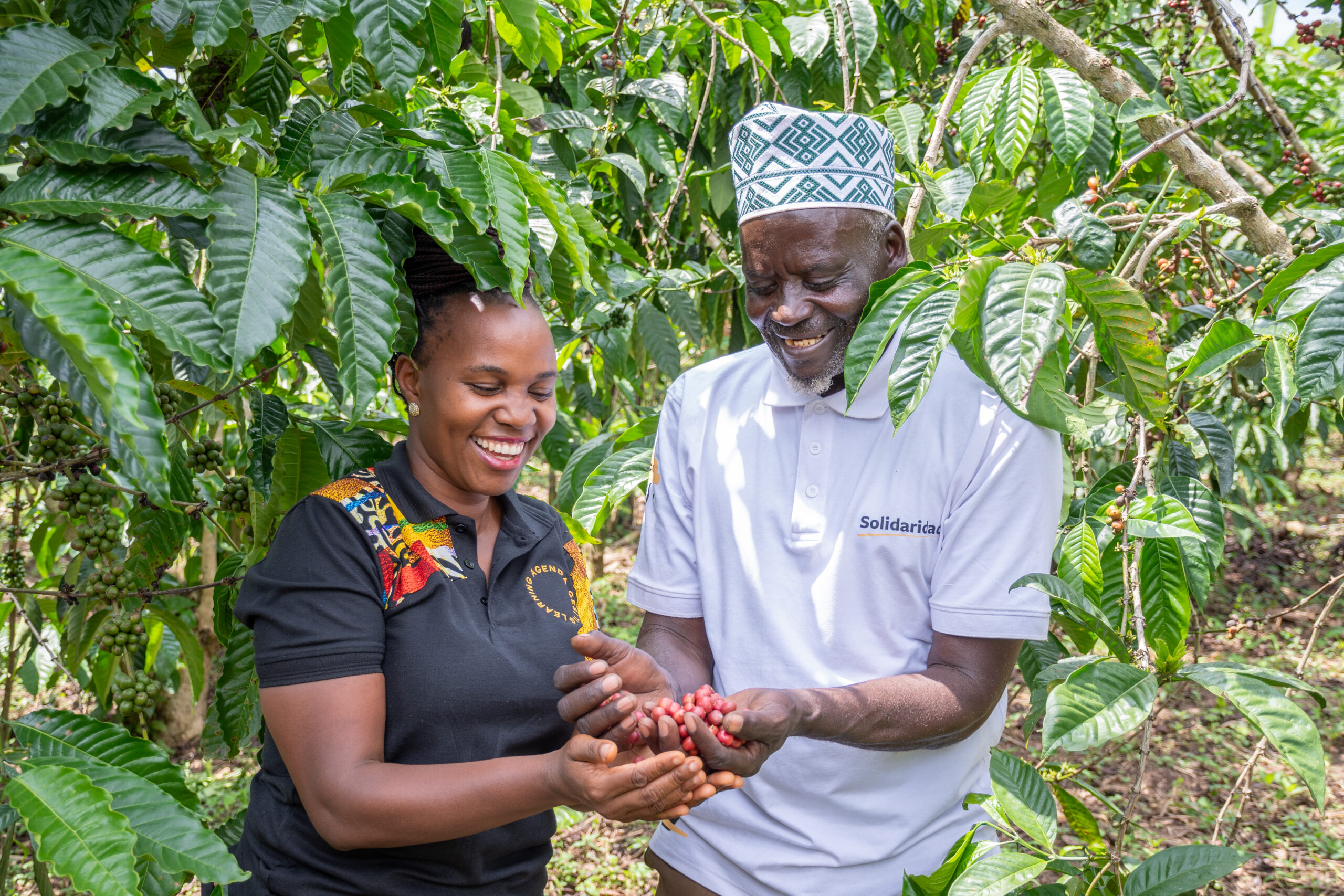Highlights
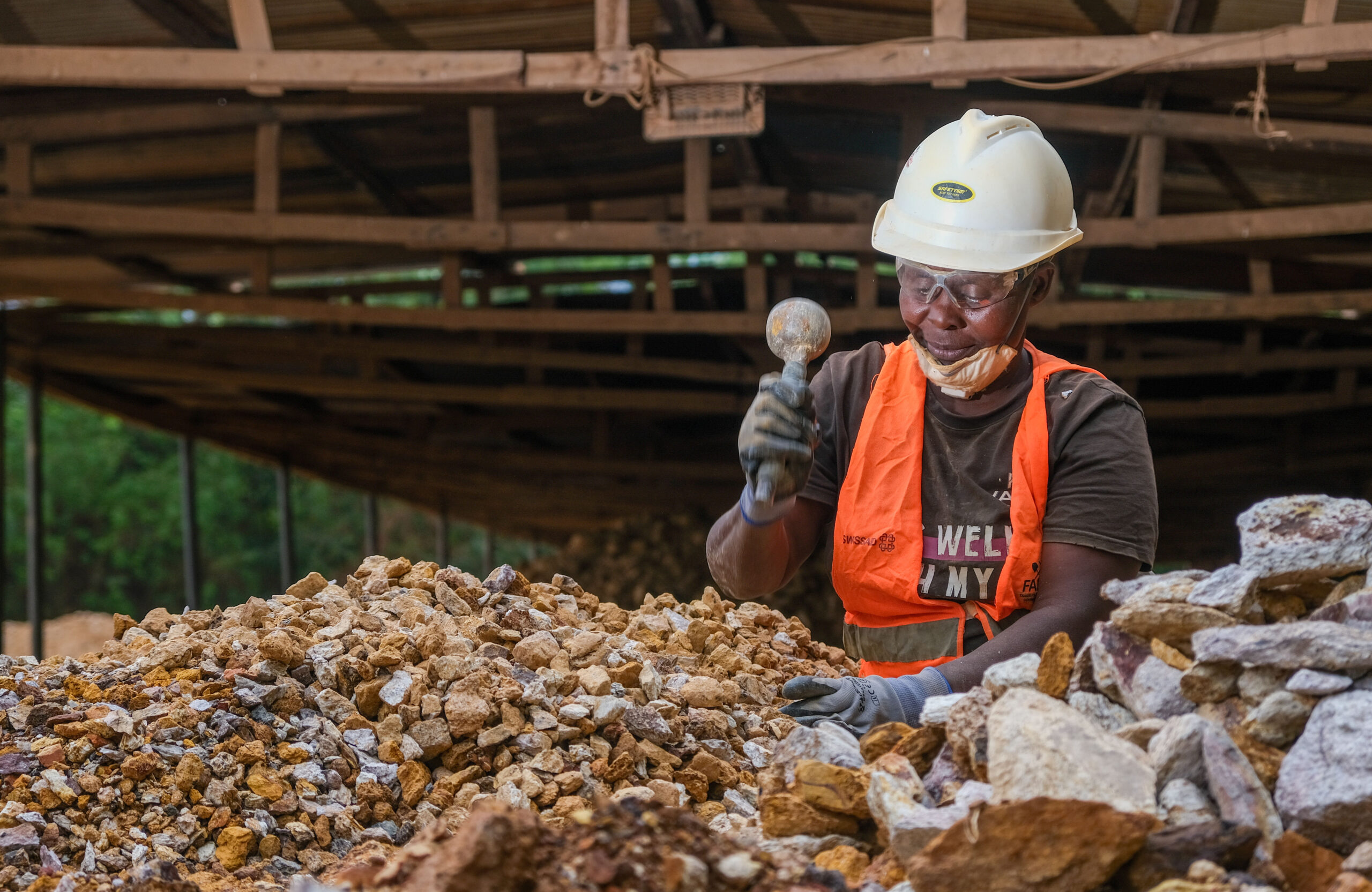
Solidaridad East Africa delivered training on geological concepts, among other topics, reaching 6,531 miners in Kenya, Tanzania, and Uganda. To address mercury pollution, we designed and distributed 130 improved retorts to 130 mines in Kenya and Tanzania and delivered training on personal protective equipment (PPE), achieving a 99% reduction in mercury vapor emissions during gold processing.
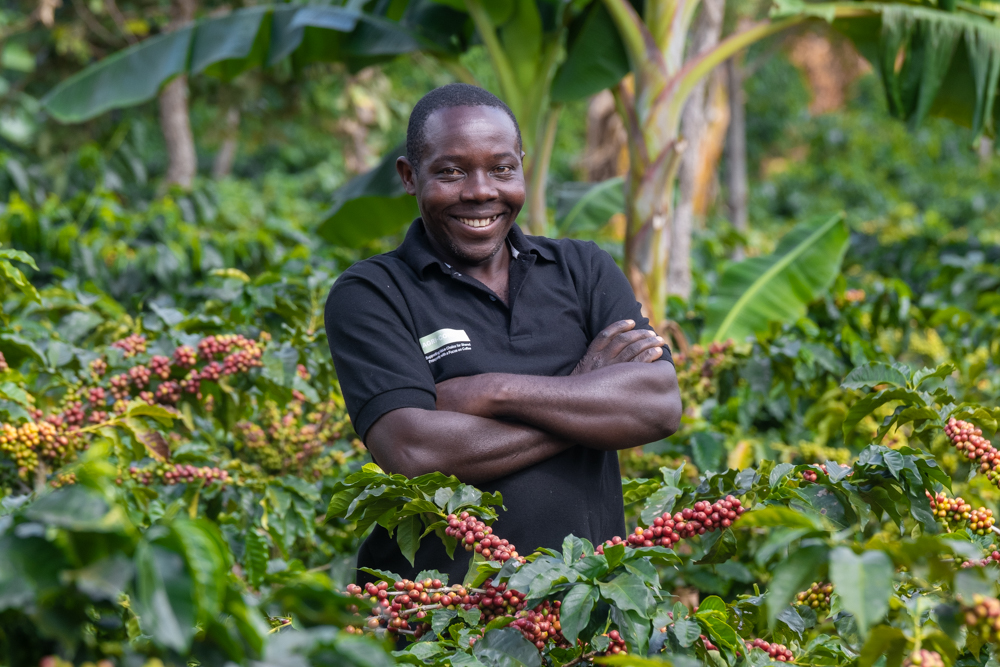
In Tanzania, we catalyzed transformative growth in 11 coffee cooperatives with Tshs 534 million (185,000 Euro) seed funding. Nine cooperatives established input shops, and two modernized processing, resulting in 5,417 new jobs for women and youth. These efforts enhanced economic independence, community resilience, and sustainable coffee systems.
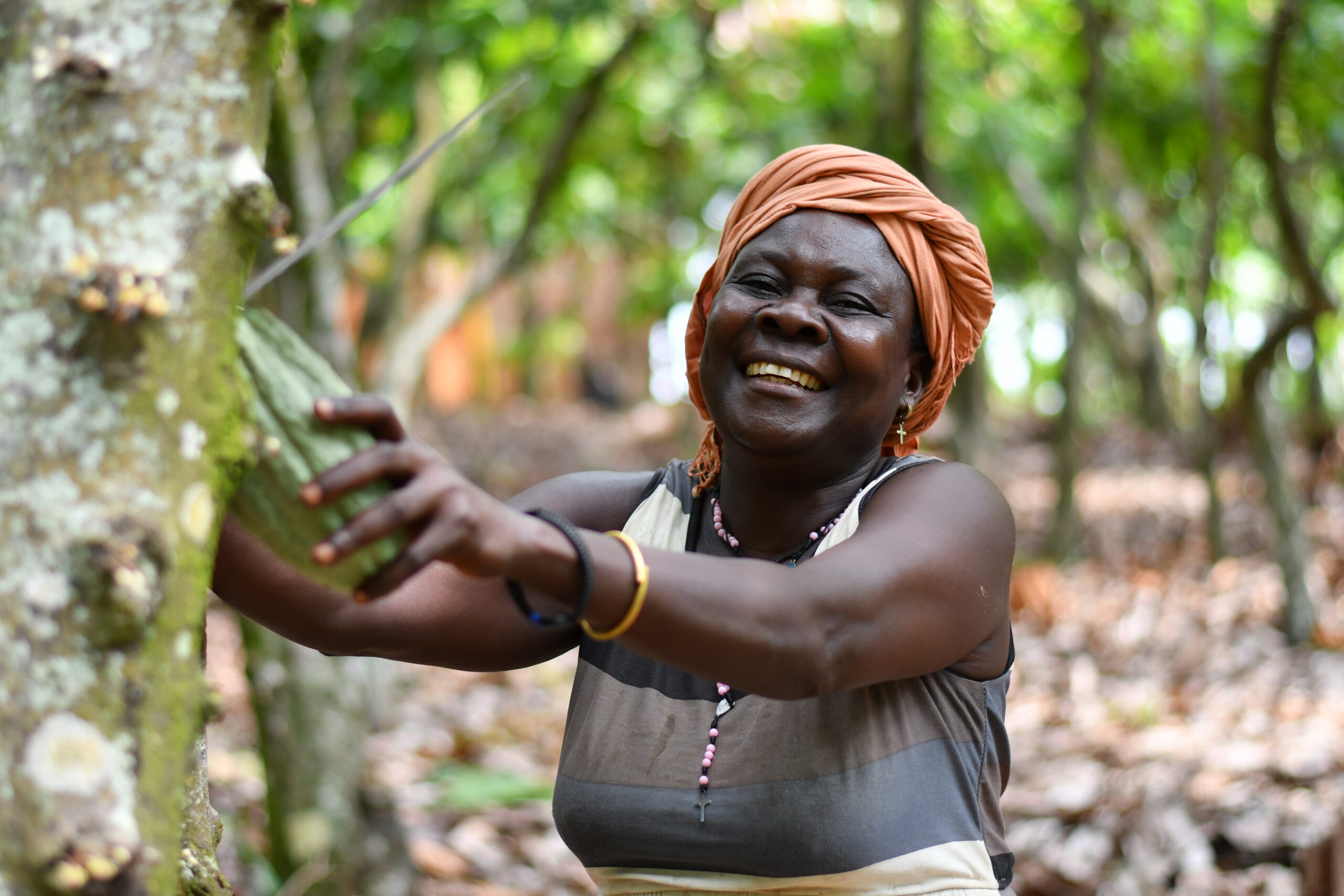
In Uganda’s cocoa sector, we initiated a study to measure the impact of the Gender Action Learning Systems (GALS) methodology on household economic empowerment, focused on decision-making, resource access, and division of labor. The findings will provide concrete evidence of how gender-transformative approaches lead to equitable outcomes.

In Kenya, maize farmers widely adopted certified seeds (84%), crop rotation (74%), and diversification (67%), which improved food security, with concerns decreasing from 26% to 13.5%. In Ethiopia, 591 ha under climate-smart practices yielded 4.9 tons, generating ETB 159 million (€1.058 million). 71% of farmers, previously reliant on government food assistance, achieved surplus production and self-sufficiency.

In Ethiopia, Solidaridad East Africa installed waste management equipment at Modjo TVET and Colba and Modjo tanneries, reducing effluent chloride by 13.8% (from 19,693 to 17,310 mg/l) and benefiting soil and water. Our innovations also enabled glue (200 kg of glue daily from 400 kg of lime trimming waste) and protein production (converting 800 kg of chrome shaving waste into 540 kg of protein hydrolysate) from tannery waste.
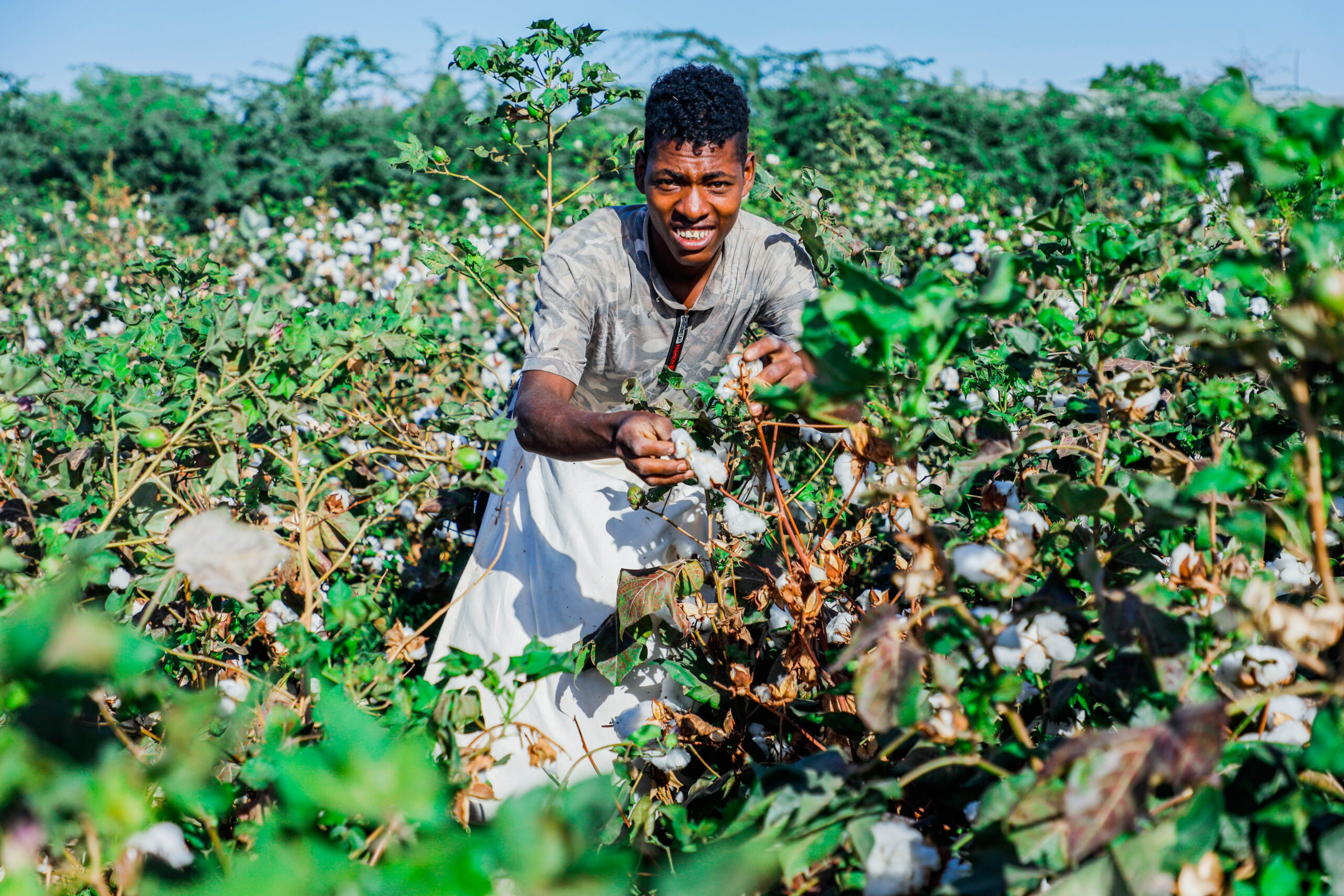
Following the approval of the Proclamation #1923/2023’s in Ethiopia, we facilitated a contract farming model. This enhanced price fairness, traceability, and farmer incomes, and was adopted as a top business model by the Ethiopian Government. The Development Bank of Ethiopia also recommends it for textile loans.
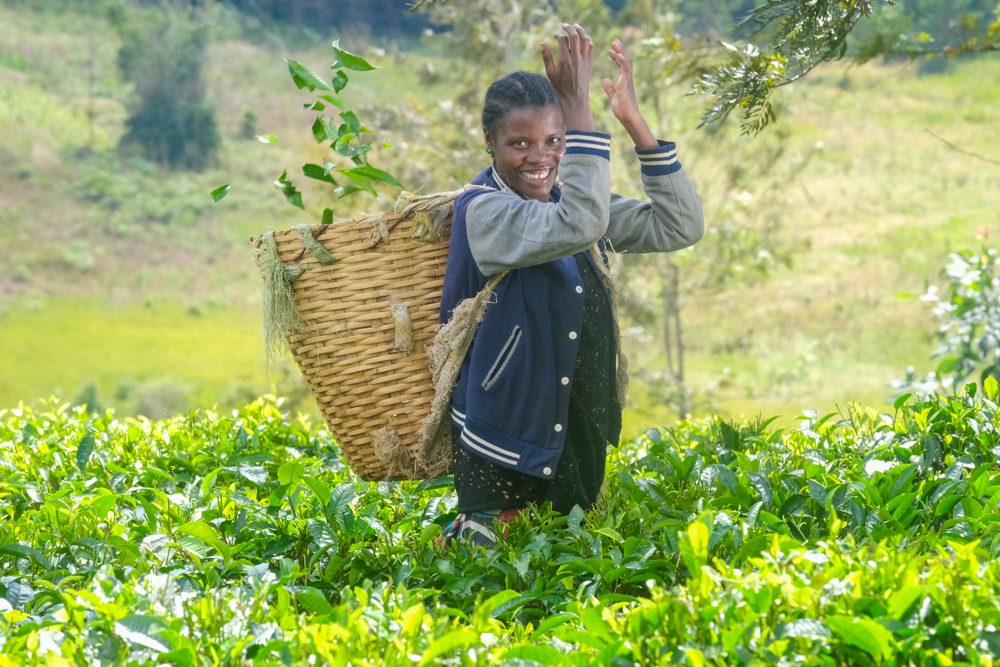
Solidaridad East Africa’s support enabled 16 tea farmers to establish specialty tea businesses, gaining access to European and local specialty tea markets. A total of 1.1 MT of high-value specialty tea was sold at Euro 5.5 per kg, compared to Euro 1.1 per kg for conventional tea—a 69% price increase directly benefiting farmers.
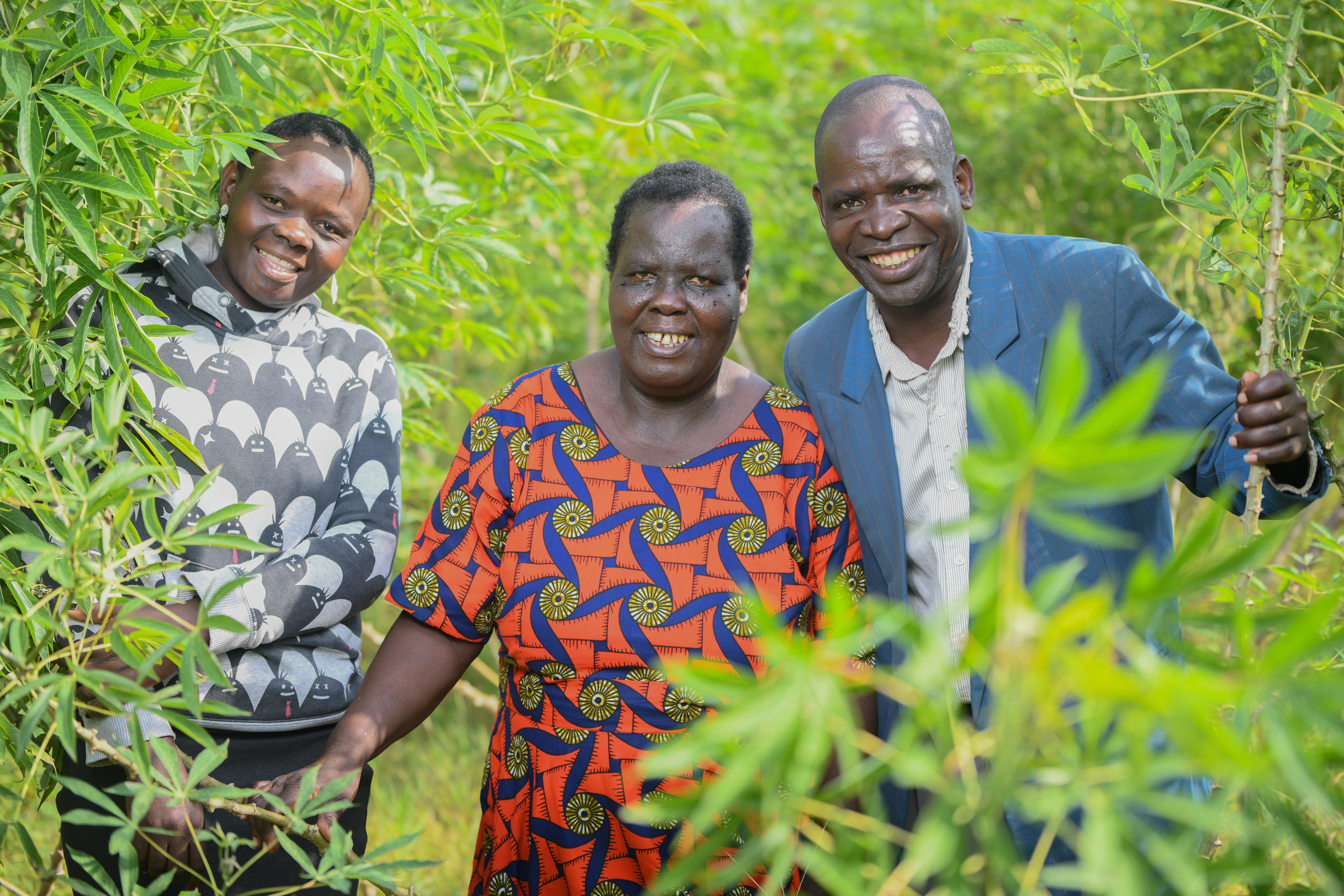
In Kenya, the Kenya National Farmers Federation Market Information System onboarded 336,375 farmers and 2,471 farmer groups, providing real-time access to crucial market trends, pricing, and trading opportunities. The Viazi Soko platform, managed by the National Potato Council of Kenya, connected 116,000 potato farmers with 218 service providers, , successfully improving digital marketing, information dissemination, and supply chain efficiency in the potato sector.
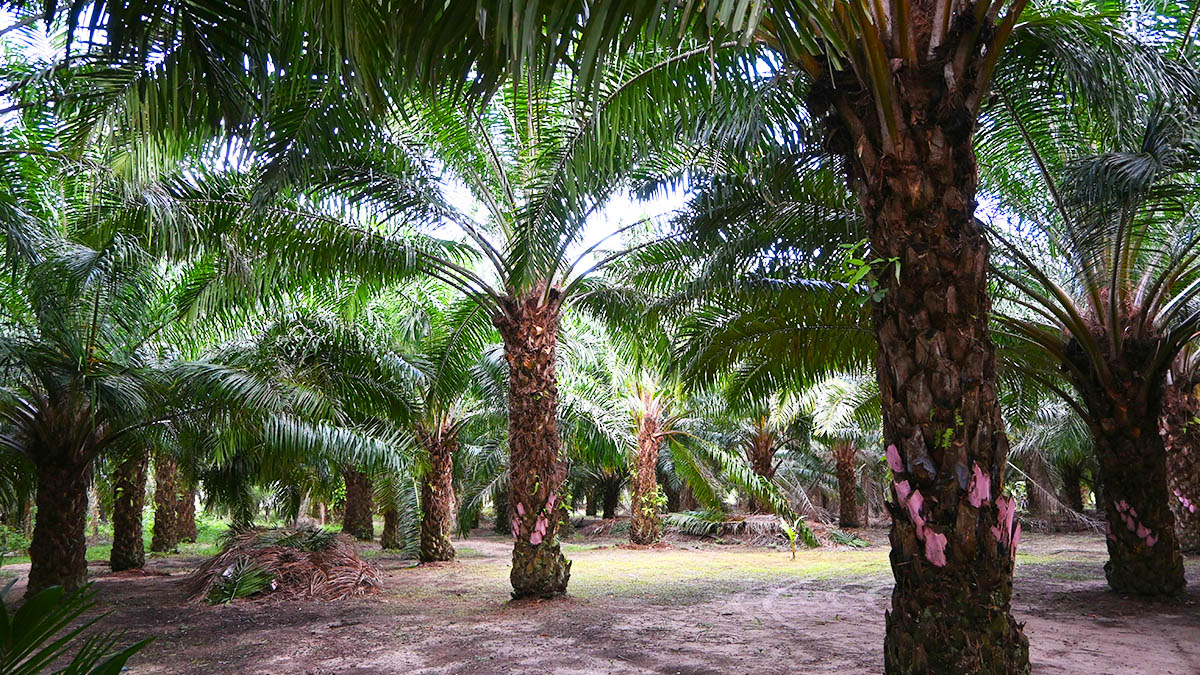
In Uganda, our flagship oil palm project expanded sustainable land management, engaging over 3,900 farmers who put 7,800 hectares under sustainable cultivation.
Results
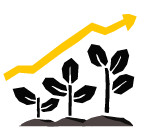
176,547
farmers with improved yield (kg/ha)

133,923
farmers with farm income increase

207,169
Farmers and miners with access to improved services
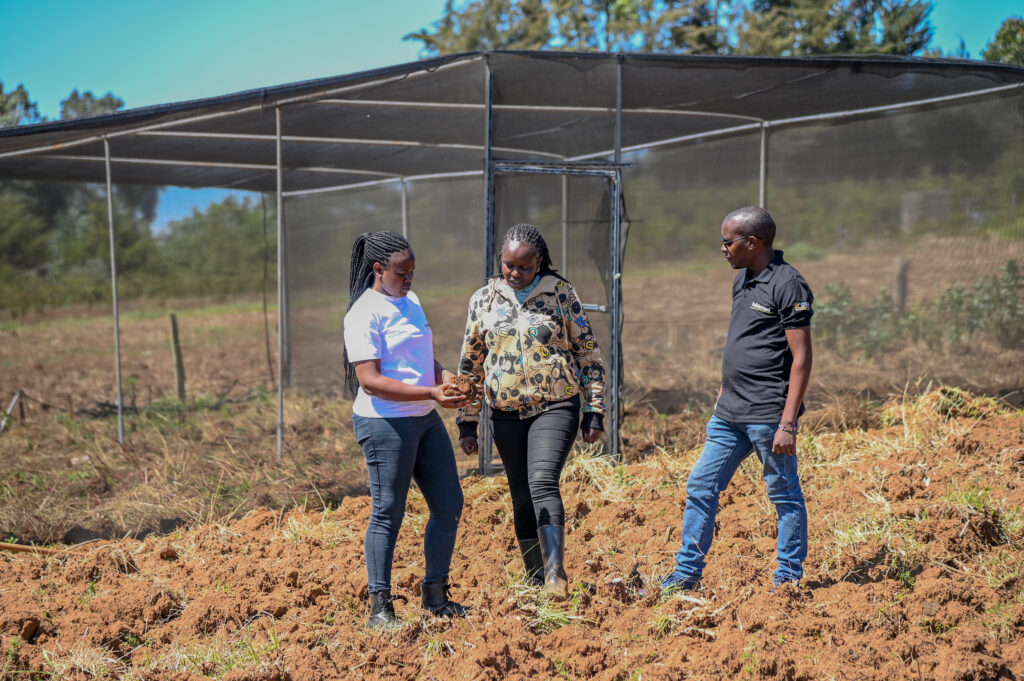
Building a lasting impact
SUSTAINABLE ACHIEVEMENTS 2024
Solidaridad East and Central Africa’s 2024 achievements reflect our holistic approach to sustainable development across agriculture, industry, and mining. By leveraging strategic partnerships, robust policies, innovative solutions, and cutting-edge technologies, we have empowered producers, strengthened communities, and enhanced market access. Our efforts have driven measurable environmental, economic, and social impact, fostering resilience and inclusive growth across the region.
In 2024, Solidaridad East and Central Africa accelerated producer-led transformation across agriculture, mining, and industry. We deepened collaboration and partnerships to build capacities and achieve a stronger balance between production and nature while accelerating prosperity and inclusivity outcomes for farmers, workers, and miners.
Building on our 2023 progress, we supported 177,000 farmers in Ethiopia, Kenya, Uganda, and Tanzania to enhance their agricultural practices. 134,000 (81.7%) farmers reported increased farm yields and incomes, demonstrating a strong link between good on-farm, harvest, and post-harvest management practices and economic benefits. Insights on household incomes from our horticulture project evaluation showed that on-farm diversification significantly boosted farmer resilience by enhancing income security and countering income instability. 66.7% of the sample households relied on both crop and livestock farming, underscoring the critical role of diversification.
Farmers embraced climate-smart technologies, including soil and water conservation techniques like drip irrigation, mulching, zai pits, and terracing. They also integrated agroforestry systems, implemented responsible agrochemical, as well as organic input usage, through composting and vermicomposting, and focused on quality planting materials and effective soil fertility, and pest- and disease management.
Local food farmers increasingly adopted our project-promoted technologies. Maize farmers in Kenya recorded wide adoption of certified seeds (84%), crop rotation (74%), and diversification (67%) directly impacting their yields and household food security, with food quality and adequacy concerns dropping from 26% to 13.5%. In Ethiopia, 591 hectares cultivated using advanced climate-smart practices, produced 4.9 tons (4,000 tons Irish potatoes, 900 tons haricot beans, and 11 tons mung beans), representing a 25% increase in food output and productivity, and generating €1.058 million. As a result, 71% of the targeted farmers, previously reliant on government food assistance, achieved surplus production and self-sufficiency.
Farmers implementing sustainable land management practices grew significantly in 2024, with 167,000 hectares under sustainable management, up from 149,000 hectares in 2023. Our flagship oil palm project contributed to this, with over 3,900 farmers, putting 7,800 hectares under sustainable cultivation. Agroforestry further accelerated this milestone. As of December 2024, 298,826 agroforestry tree seedlings had been distributed to 10,336 coffee and food crops farmers in Uganda (7,965), Tanzania (973) and Kenya (1,398).
In the industrial and mining sectors, we made significant strides by advancing the adoption of good processing, manufacturing, and waste management practices. In Ethiopia’s leather industry, we installed three waste management equipment for salt reuse, glue production, and protein extraction at the Modjo TVET College, Colba, and Modjo tanneries. The innovations reduced tannery environmental impact and created value from waste products. The salt reuse equipment reduced chloride levels in tannery effluent by 13.8% (19,693 mg/l in the control sample compared to 17,310 mg/l in the experimental sample), a substantial reduction that stands to benefit the environment by lowering soil and water salinity, addressing the resultant plant stress, and growth, and aquatic toxicity.
The leather sector realized tangible results in waste transformation and value creation. Colba Tannery and Modjo TVET College now produce 200 kg of glue daily from 400 kg of lime trimming waste, providing a sustainable, local alternative to imported adhesives and benefiting the construction sector. Furthermore, Colba Tannery enhanced its position as a center of excellence in solid waste management, converting 800 kg of chrome shaving waste into 540 kg of protein hydrolysate, replacing costly imported leather fillers. These innovations strategically drove sustainability, created jobs, and added significant value to the local leather industry.Addressing environmental and safety concerns in the Artisanal and Small-Scale Gold Mining sector remained a core focus. 6,531 miners were reached through targeted education on, among others, geological concepts in Kenya and Tanzania, and Uganda. In Kenya and Tanzania, the training reduced land pollution, evidenced by fewer new and abandoned pits. To address mercury pollution, Solidaridad, designed and distributed 130 improved retorts to 130 mines, and delivered training on personal protective equipment, leading to a 99% reduction in mercury vapor emissions during gold processing. By providing occupational health and safety training and enforcing robust standards, we also improved working conditions for 6,531 miners. Across the region, training on personal protective equipment and the other initiatives promoted both miner health and environmental protection.
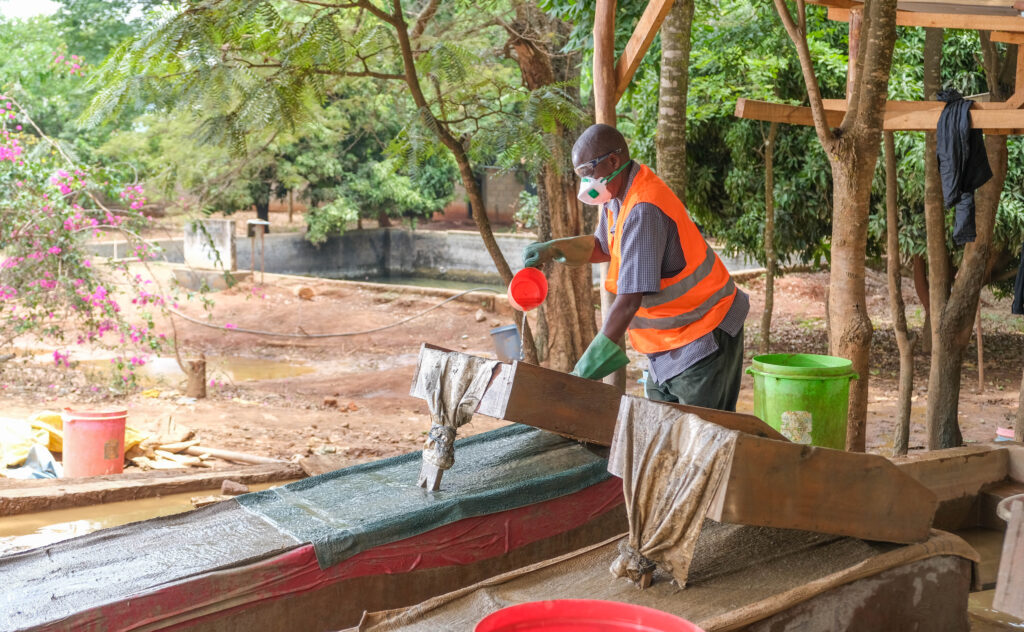
Solidaridad East and Central Africa delivered integrated support to small-scale producers, producer-led enterprises, and Micro, Small, and Medium Enterprises responding to the interconnected nature of their challenges. By focusing on both operational and financial efficiency, our initiatives addressed key needs. These included building farmer cooperative leadership and governance capacity, enhancing marketing skills, financing viable business cases like nurseries, facilitating access to essential inputs through service provider connections, and expanding financial inclusion, paving a pathway to sustainable growth.
As a result, service providers improved access – availability, accessibility, and affordability – to essential inputs and services for farmers and artisanal miners. This resulted in 201,000 farmers accessing critical inputs, engaging with service providers, or benefiting from vital services. Furthermore, by collaborating with farmer procedure organizations, Solidaridad optimized service delivery, reduced input costs through collective purchasing, and streamlined produce aggregation, empowering farmers to access more favorable markets and pricing.
Throughout the year, we strategically advanced access to finance for smallholder farmers and miners, recognizing the critical financial barriers these sectors face. Our efforts focused on three key areas: enhancing the investment readiness of producer enterprises through targeted capacity-building, facilitating vital linkages between producer groups and financial institutions, and promoting innovative financing mechanisms such as digital financial services and microfinance.
We built investment readiness for four tanneries and 150+ farmer cooperatives through capacity-building and linkages with financial institutions. This directly resulted in outcomes like Bushika Integrated, a Ugandan cooperative, securing Ugx 277 million (66,630 Euro) in working capital. This funding enabled the cooperative to purchase and process a container of coffee for export, which facilitated coffee sales to premium European buyers, generating increased revenue and resulting in 6.2% better prices for farmers, positively impacting over 2,800 coffee farmers. Active cooperative membership also grew marginally from 1,889 to 2,015. We catalyzed transformative growth in 11 Tanzanian coffee cooperatives with Tshs 534 million (185,000 Euro) seed funding. Nine cooperatives established input shops, and two modernized processing, resulting in 5,417 new jobs for women and youth. These efforts enhanced economic independence, community resilience, and sustainable coffee systems.
Our capacity-building and support in the tea sector enabled the National Association for Women in Tea Uganda to secure a Ugx 98 million (23,708 Euro) grant from the Women Grow Fund, directly empowering women in the specialty tea production. The association also secured a partnership with PUM Netherlands to drive economic empowerment for women in the sector through value addition and market access. PUM’s support will facilitate the acquisition of tea processing machines, access to advanced training and markets, and financial empowerment through a women-led tea Savings and Credit Cooperative Organization (SACCO).
Sustained efforts to expand financial inclusion, particularly through Village Savings and Loan Associations (VSLAs), yielded results. In Ethiopia’s leather sector, VSLAs empowered women economically, facilitating the establishment of income-generating activities (poultry, livestock, and small businesses). In Tanzania’s coffee sector, 2,540 women in 75 VSLA groups successfully mobilized Tshs 943,841,500 (€320,000). This capital enabled investments in sustainable practices, essential inputs, and diverse income-generating ventures, demonstrating the VSLA model’s effectiveness in driving financial inclusion for rural communities.
Technology accelerated transformation in all our focus supply chains, significantly enhancing market transparency and accessibility. Through our local food projects in Kenya, the Kenya National Farmers Federation Market Information System onboarded 336,375 farmers and 2,471 farmer groups, providing real-time access to crucial market trends, pricing, and trading opportunities. The Viazi Soko platform, managed by the National Potato Council of Kenya, connected 116,000 potato farmers with 218 service providers, including six seed companies, three fertilizer companies, five agrochemical companies, one soil testing provider, four potato processors and traders, one logistic company, 72 spray service providers, and 126 farm service providers. The platform, integrated with a web portal, mobile app, and USSD system, successfully improved digital marketing, information dissemination, and supply chain efficiency in the potato sector.
Knowledge transfer remained a critical enabler for farmers and miners. Our projects employed a comprehensive approach, including the Trainer-of-Trainer model and practical demonstrations to provide direct access to best practices in agriculture and mining. In collaboration with the trainers-of-trainers, lead farmers, and gender champions, we ensured that knowledge and skills were embedded in communities. Field days, exchange visits, expos, and multi-stakeholder platforms served as vital hubs for collaborative knowledge exchange, fostering direct engagement between our farmers, and miners, industry experts, and peers and facilitating wider adoption of impactful solutions. Complementing these efforts, digital channels (such as bulk messaging) significantly expanded access to crucial market data, safety protocols, and sustainable practices, ensuring even remote communities were equipped with essential information. This multi-faceted approach to knowledge sharing acted as a powerful catalyst, enabling farmers and miners to enhance their livelihoods and contribute to sustainable resource management.
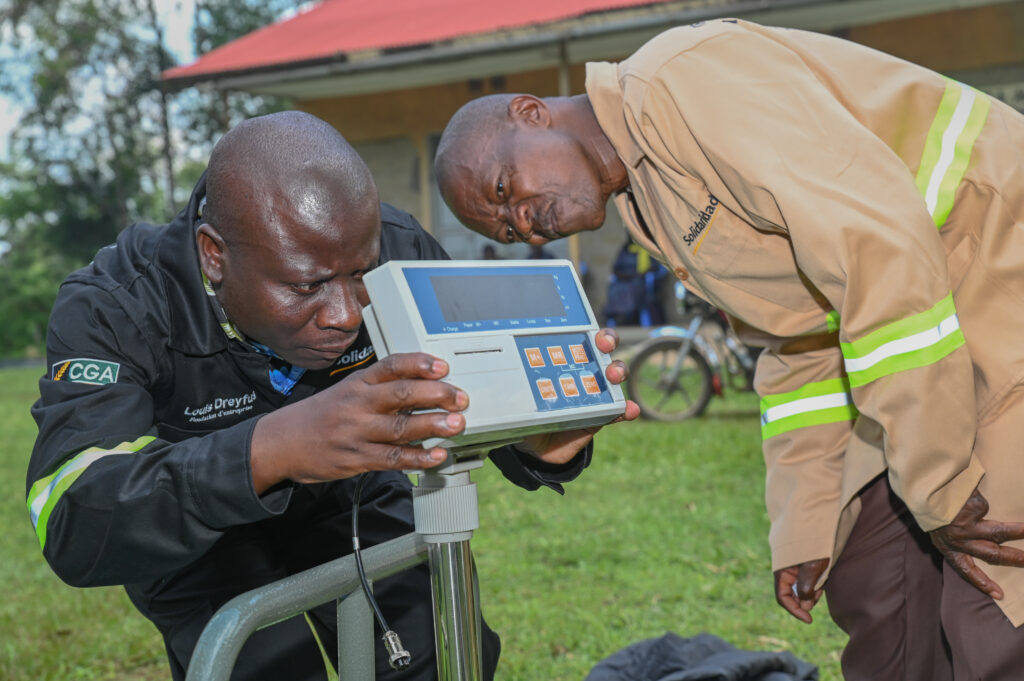
Driven by a commitment to equitable and sustainable supply chains, Solidaridad East and Central Africa’s 2024 activities centered on amplifying the voices of producers. We achieved this through a multi-pronged approach: empowering producer organizations to actively shape policy, strengthening inclusive multi-stakeholder platforms for collaborative decision-making, championing transparent supply chains via digital traceability, and partnering with governments to embed inclusive, climate-adaptive, and regenerative practices into national policy frameworks. These integrated efforts aimed to ensure producers’ influence on key decisions, foster fair market regulations, and drive transformative change.
As our regional policy influencing programme approached its fifth year, 2024 marked a peak in advocacy engagements, necessitating robust coordination with civil society organizations and multi-stakeholder platforms. This heightened activity resulted in increased CSO participation in shaping policies across tea, coffee, local food, gold, cotton, and textile supply chains. The number of CSOs actively influencing policy rose from 43 in 2023 to 57 in 2024. Furthermore, citizen mobilization efforts under the programme successfully engaged 76,000 citizens across Ethiopia, Kenya, and Uganda, effectively amplifying their voices in critical policy discussions.
Our policy-influencing efforts yielded significant advancements in the agriculture and mining sectors, enhancing transparency, sustainability, and smallholder protections. These producer-driven advocacy initiatives resulted in policy enactments and reforms.
Kenya’s tea sector saw the successful enactment of crucial tea sector regulations, including the Tea (Levy) and Tea (Licensing and Registration) Regulations, as well as the adoption of Corporate Governance Guidelines and a Code of Conduct. Furthermore, Regulatory Impact Statements and manuals were developed for the election of representatives to the Tea Board of Kenya, ensuring representation for small, medium, and large-scale tea growers and traders. Green Leaf Quality and Tea Blending requirements were also established. Moreover, key recommendations from the Kenya Coffee Producers’ Association were integrated into the Kenya Coffee Bill, and proposals for the Cooperatives Bill 2024 were submitted to the National Assembly.
Uganda witnessed progress in food safety and mining regulations. In partnership with the Consumer Protection Association of Uganda, a Maximum Residue Limits (MRL) Policy Paper was developed to regulate pesticide use. Five civil society organizations – Advocacy Coalition for Sustainable Agriculture (ACSA), Slow Food International, Hortifresh, HORTEXA, and Pelum – collaborated on a Plant Genetics Position Paper, submitted to the Ministry of Agriculture for adoption. Additionally, the Uganda Mining (Licensing) and Regulations for Artisanal and Small-scale Mining were finalized and submitted for ministerial approval.
Ethiopia’s garments and textile sector benefited from the development of an Integrated Management System (IMS) guideline aimed at supporting global compliance, market access and policy recommendations for the Ethiopia Cotton Marketing System, advocating for a minimum support price for farmers. Crucially, parliamentary approval of Proclamation #1923/2023 established a regulatory framework for agricultural contract farming. Following this milestone, Solidaridad facilitated the implementation of a contract farming model, benefiting seven organic cotton producer cooperatives and Gamo development associations, enhancing price fairness, traceability, and farmer incomes. The model’s success was recognized by the Ethiopian government, which adopted it as one of their top three business models. Further validating its effectiveness, the Development Bank of Ethiopia now recommends its inclusion in textile factory loan applications, facilitating greater financial access for cotton producers.
In 2024, Solidaridad East and Central Africa focused on empowering small-scale producers to thrive in competitive markets by enhancing market access, financial resilience, and value chain transparency.
Our revamped blockchain-based Solichain system onboarded 16,000 farmers, automating commodity tracking and enhancing transparency. This system automates farm-to-consumer tracking, delivering greater transparency, streamlined communication, and enhanced accountability across multiple value chains and countries. Stakeholder workshops were conducted to validate system functionality in readiness for full-scale testing planned for 2025. In partnership with the Progreso Foundation, we piloted Beyco, a digital market platform designed to enhance market access for East African coffee. Beyco directly connects coffee buyers with producers, fostering transparency and traceability. The platform successfully onboarded five farmer groups and 15 estate farmers in Kenya, strengthening direct-to-market sales opportunities.
To expand market access, we engaged key stakeholders and buyers through regional and international events. Participation in the Specialty Coffee Association Exhibition (USA), the African Fine Coffees Association Conference (Ethiopia), and the 24th Annual Africa Business Forum facilitated the forging of valuable partnerships and buyer connections. These forums provided platforms to showcase premium African coffees and engage with stakeholders across global value chains. Notably, coffee cupping sessions offered buyers firsthand experience, attracting interest from leading companies, including Starbucks, Volcafe, Touton, ECOM Group, Pino Coffee, and Africa Coffee Roasters.
We strengthened market connections for Kenyan farmers by hosting the first Nairobi Coffee Exchange cupping session, engaging 150 farmers from eight counties. Farmers, who submitted 40 samples for sampling, engaged with buyers, and gained critical market insights (trends and pricing strategies). Building on our achievements promoting organic coffee farming for farmers in Kenya, we spearheaded the European Organic System certification process, which will see two estates and three cooperatives undergo rigorous audits for certification in 2025. Our commercial partner, African Coffee Roasters, will deliver Kenya’s first organic-certified coffee to global markets in 2025, securing premium prices for at least 2,521 farmers.
Our business-to-business initiatives and matchmaking efforts further catalyzed a transformative shift in the agricultural landscape for small-scale farmers in the region. In Ethiopia, we secured €0.73 million in pre-sale contracts for haricot beans between farmer organizations and buyers. In Tanzania, 10 market linkages facilitated exports of 379.34 MT of horticultural products, coffee, and tea. In the cotton sector, our contract farming model expanded market linkages for 800 cotton farmers in Ethiopia. This model resulted in a yield of 500 tons of organic cotton across 1,000 hectares, generating €0.2 million – an 11% increase over pre-agreement earnings.
In Kenya, we supported maize farmers to establish 10 producer groups that merged into three aggregation centers. The centres were equipped with shellers, moisture meters, tarpaulins, pallets, digital weighing scales, and record-keeping tools to enhance efficiency and reduce post-harvest losses. Between July and September 2024, one centre served 520 farmers, generating Kshs 208,000 (€1,486) in shelling income and aggregating 55.8 MT of maize valued at Kshs 1.86 million (€14,418.60). Annually, the three aggregation centres are projected to serve 4,197 farmers, aggregate 755.46 MT of maize valued at Kshs 25.8 million (€195,209.30). These interventions improved collective bargaining power, enhanced market stability, and boosted farmer incomes.
Through our carbon farming initiative, we achieved 20,718 tCO2eq sequestration and sold 11,530 Carbon Removal Units (CRUs) to Microsoft via ACORN, generating €273,738 for 5,499 Ugandan farmers managing 23,787 hectares—a 42% increase from the previous year’s 7,700 CRUs. In Kenya, 6,000 farmers who received training in climate-smart practices realized yield improvements from 2 kg to 5 kg per coffee tree, and sequestered 1,327 CRUs. In the tea sector, 16 farmers established specialty tea businesses, gaining access to European and local specialty tea markets. A total of 1.1 MT of high-value specialty tea was sold at Euro 5.5 per kg, compared to Euro 1.1 per kg for conventional tea—a 69% price increase directly benefiting farmers.
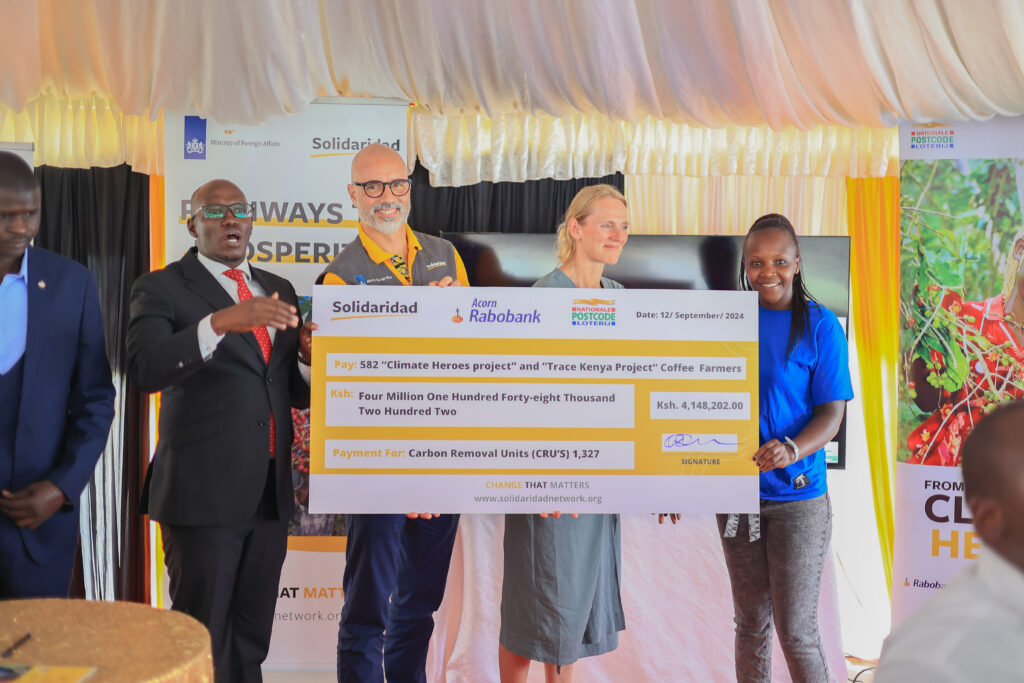
The Responsible Mineral Credit system, a collaboration between Solidaridad, the Impact Facility, and Fairphone, offered financial incentives to promote responsible artisanal and small-scale gold mining in Tanzania. This mechanism delivered three key benefits:
- encouraged the adoption of environmentally sound mining practices, reducing ecological impact;
- improved market access for miners adhering to compliance standards, securing better prices; and
- successfully attracted three downstream companies committed to sourcing responsibly mined gold from Solidaridad’s supported mines.
Through its focus on supply chain transparency and ethical sourcing, the system is facilitating a shift towards sustainable artisanal and small-scale mining practices in Tanzania.
Change stories
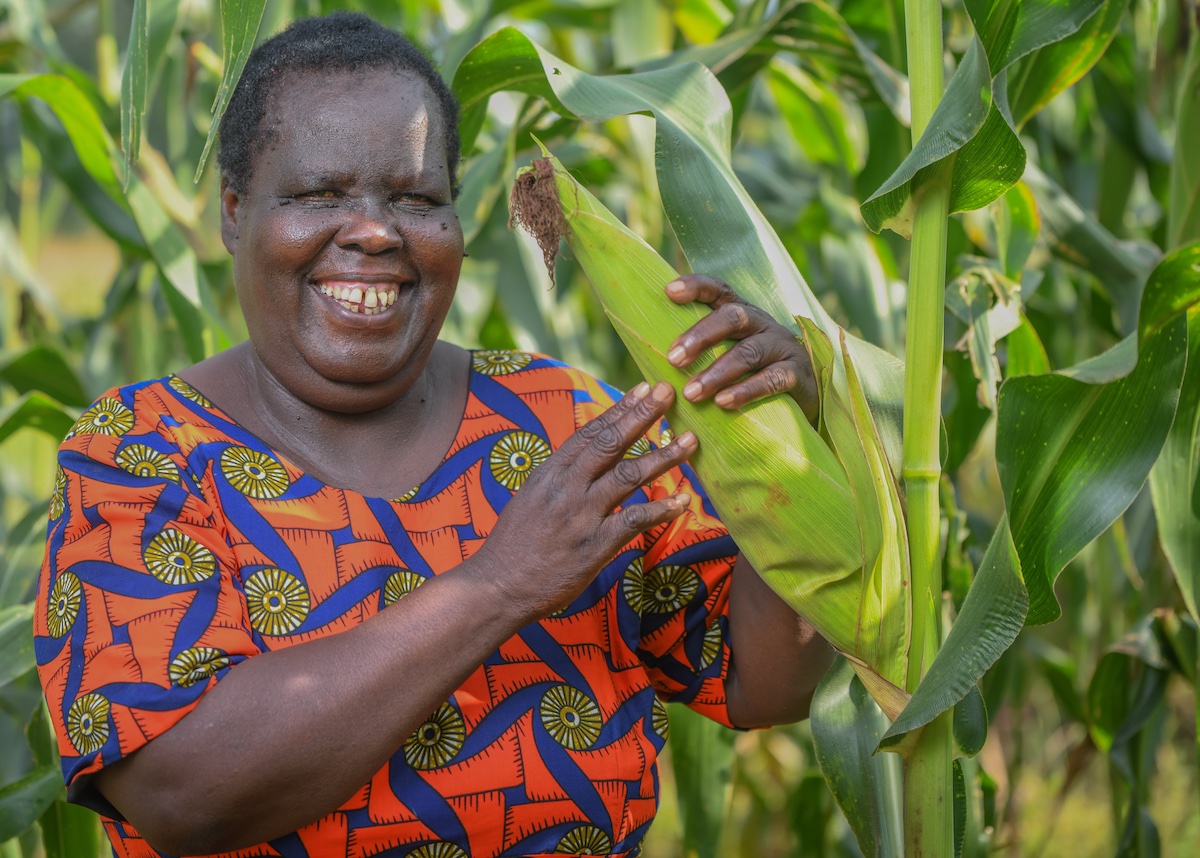
Jackline Sakwa, a 63-year-old Kenyan farmer, has seen a remarkable increase in her maize harvest thanks to a project designed to support sustainable farming practices, increase farmers’ resilience to climate change, and advance gender and social inclusion in Bungoma County by 2025. After just two years, the Creating Shared Value in Maize Value Chain in Kenya project has led to increasingly bountiful harvests with farmers like Jackline seeing livelihood improvements
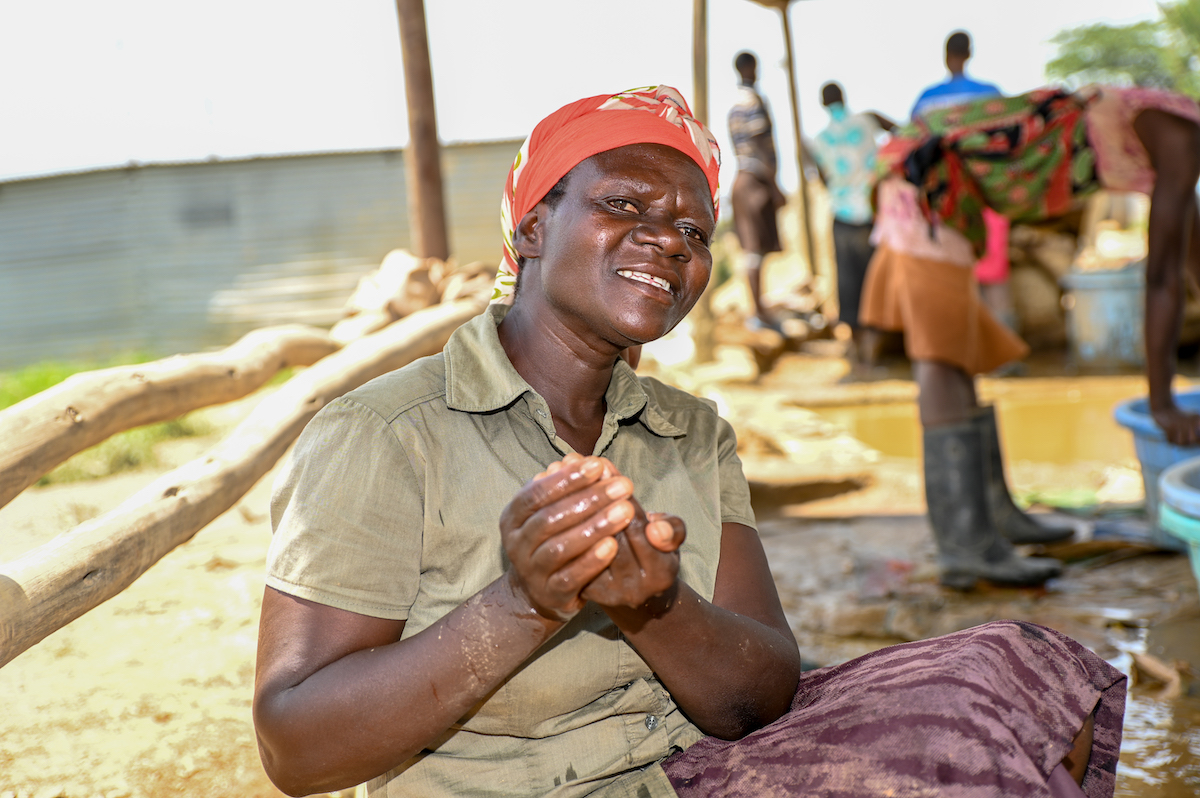
Women play a vital role in Kenya’s artisanal and small-scale gold mining sector, but they face significant challenges. Exposure to harmful substances, long hours, and low pay are common. Eunice Atieno, a dedicated miner, is working to improve conditions for women in her community. She is raising awareness about safety, advocating for fair wages, and inspiring other women to demand better working conditions as they strive for a brighter future.
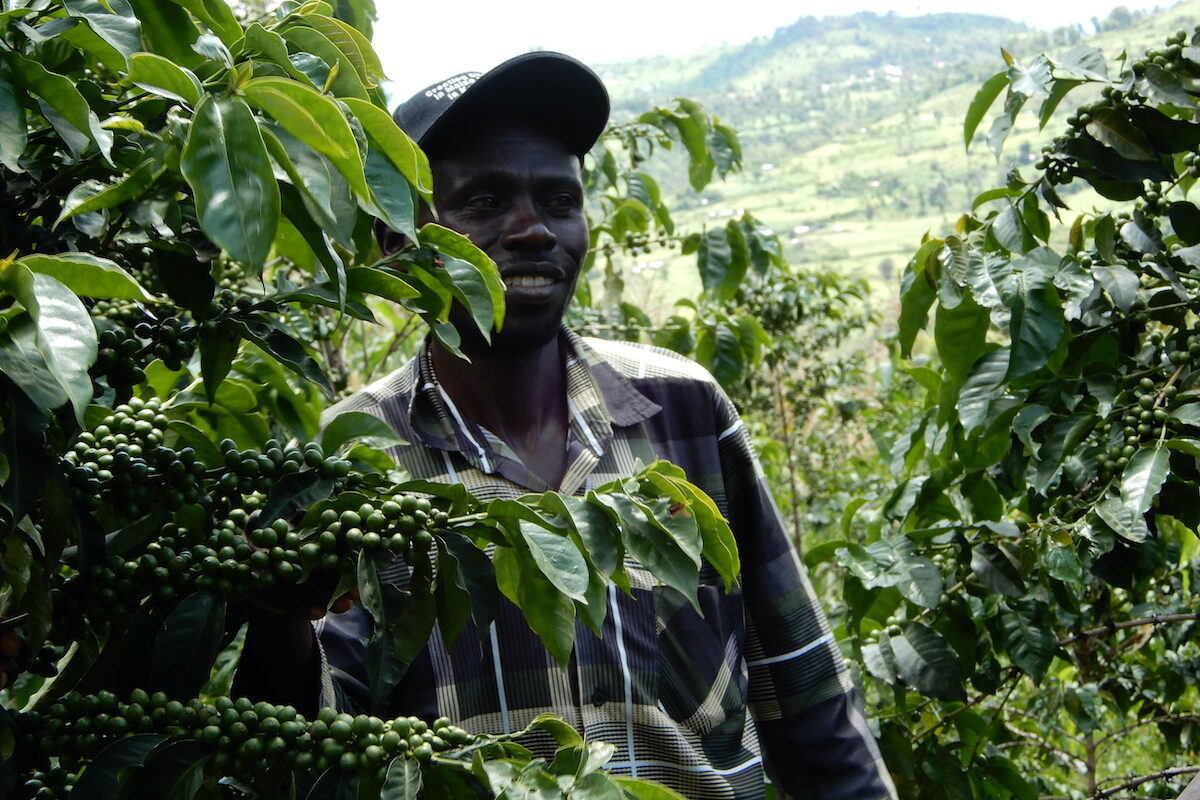
Like many, Richard Rono is seeing the real time impacts of climate change. Unpredictable rainfall has resulted in lower coffee yields for this Kenyan coffee farmer, but Solidaridad’s TRACE Kenya project is helping him build up his resilience. Organic farming practices have boosted his harvest and now Richard is sharing what he’s learned with others in his community as a lead farmer.
Innovative Sustainability Solutions
Innovation for change
In 2024, Solidaridad East and Central Africa prioritized innovative solutions across multiple sectors, from advancing gender equality to implementing digital platforms for improved efficiency.
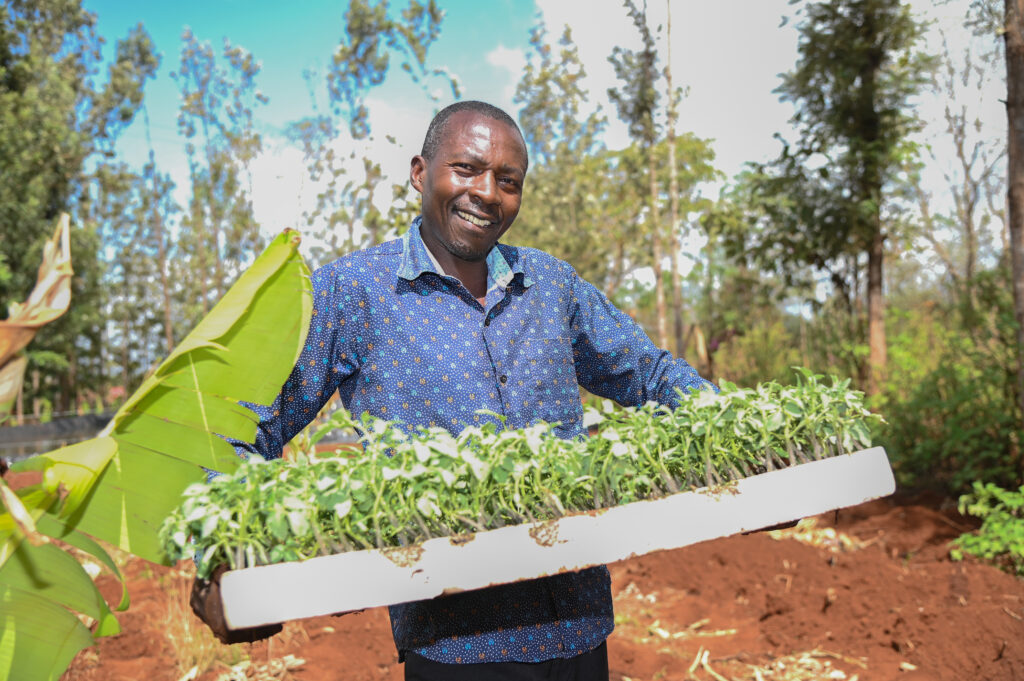
In 2024, we drove transformative solutions to advance gender equity. In Kenya and Uganda, we conducted learning assessments in the coffee and tea sectors. These assessments, supported by a learning agenda, revealed critical barriers to meaningful participation of marginalized producers, particularly women, in multi-stakeholder platforms, underscoring the need for tailored strategies that address socio-cultural and economic barriers, ensuring their voices are heard and valued.
We continued to expand and strengthen Gender Smart Villages, an approach that empowers gender champions through training in methodologies like Start Awareness Support Action, Gender Action Learning Systems (GALS), engaging men in accountable practices, and Economic and social empowerment, enabling them to engage households and communities on gender and inclusion. In Uganda’s cocoa sector, we initiated a study to measure the impact of the GALS methodology on household economic empowerment, focused on decision-making, resource access, and division of labor. The findings will provide concrete evidence of how gender-transformative approaches lead to equitable outcomes.
In Ethiopia, our efforts sought to advance gender-inclusive monitoring, evaluation and learning systems for equitable and transformative impact. We are positioned to support key partners in gender-specific monitoring and evaluation, to catalyze the development of robust systems that accurately capture gender-specific indicators.
In Kenya and Tanzania’s gold and coffee sectors, we drove economic empowerment by combining value-addition training with market access for women and other marginalized groups.
Solidaridad deployed Nature Based Solutions, to address climate challenges and promote sustainable practices. In Kenya and Tanzania, we collaborated with like-minded organizations on training and conducted field visits to foster co-creation of agroforestry designs. Through this approach, we aim to drive adoption, ownership, and scalability of practical agroforestry solutions, demonstrating best practices for achieving diverse climate action benefits in agriculture.
Several pilots were conducted exploring biochar as a scalable solution for enhancing soil health and resilienceschieved CERES Certification for Environmental Standards in November 2024. Beyond soil health improvements, biochar is envisaged to provide mitigation co-benefits, diversify climate action strategies in East Africa, and create potential revenue opportunities for farmers through international carbon markets.
Solidaridad launched a “pay-for-impact” project to demonstrate viability of insetting initiatives and attract corporate investment. We also prioritized regulatory compliance, following Kenya’s carbon market regulations by conducting impact assessments, and engaging with authorities in Ethiopia, Tanzania, and Uganda.
Throughout the year, we prioritized proactive adaptation, resulting in the refinement of our Climate Vulnerability Assessment (CVA) tools, designed to monitor the impact of climate variability and change on farmers, farms, and ecosystems. To enhance our ability to anticipate and forecast risks, a Disaster Risk Reduction component will be integrated into our Climate Adaptation Index tool, with further refinements planned for subsequent years.
To improve our carbon pre-financing, we conducted a stakeholder review (farmers, providers, partners). The feedback highlighted the need for: periodic SMS updates on Carbon Removal Units, increased seedling allocation (beyond 25 trees for larger farms), and customized seedling selection (e.g., Meiopsis eminii). This emphasizes a farmer-centric design approach, prioritizing consistent communication, flexible resources, and localized solutions for greater impact.
A regional mapping and evaluation of our service provision models revealed tea and coffee as dominant value chains, with input supply and advisory services being most common. Agronomic advice and seeds were the most preferred interventions. Advisory services had the highest uptake among farmers across the region. Loans were the primary financial service, while post-harvest support focused on storage and market linkages. Waste valorization was limited, except in Ethiopia’s leather sector. Enterprise-led models dominated service provision, supplemented by farmer and government initiatives.
As part of the ANDE Climate Action Lab, we supported the design of a Technical Assistance Facility and an Investment Fund for waste management and circularity. The Technical Assistance Facility is providing coaching to 11 entrepreneurs on sales, marketing, finance, and waste valorization for investment readiness.
We also developed strategic business cases for our interventions, using scenario analysis to minimize farmer risk and maximize returns. These models include: one for private-sector partnerships to assess the feasibility of acquiring external finance for organic fertilizer manufacturing and distribution, and two for conservation interventions focusing on agroforestry, organic manure, and biochar.
To strengthen climate change and emissions reporting, we developed a Measurement, Reporting, and Verification system. Integrated with the Cool Farm Tool, it tracks emissions of carbon dioxide, nitrogen oxide, and methane in the dairy, encompassing enteric fermentation, feed and manure management, grazing land, transport, energy, and processing. Key features include data filtering by assessment year, administrative level, and farmer cooperative, as well as a validation module that provides auditors/verifiers with access to raw data and calculated emissions for independent verification. Planned enhancements include expanding the system to support measurement and reporting for crops value chains.
We also developed a quality-based milk payment system, featuring three specialized mobile applications for farmers, milk collectors, and dairy hubs, alongside a comprehensive web-based dairy hub management dashboard. Functionalities include dairy hub and farmer registration, operations management, milk collection with fat and water content measurements, quality-based milk pricing, sales and payment management, profit and loss reporting, and farmer-centric service provision management. The system supports multiple dairy hubs and offers bilingual support (English, Oromifa, and Amharic) to enhance user experience. Currently, the system is being piloted in Ethiopia.
To streamline financial services for farmers, we commissioned the development of a payment and loan management system. This solution automates input pre-financing and payments for carbon removal, featuring functionalities such as farmer profiles with wallets, loan applications and management, automated loan deductions, and portfolio management. It also includes mobile money wallet verification and end-to-end payment integrations, supporting approval flows in Kenya, Tanzania, and Uganda.
Organization & governance
Optimizing Operations, Maximizing Impact
Throughout 2024, we prioritized organizational strengthening. We enhanced our capacity for sustainable impact through strategic evaluations, improved HR, impactful communication, and robust financial management. This focus ensured greater resilience and effectiveness across all sectors, positioning us for continued growth and success.
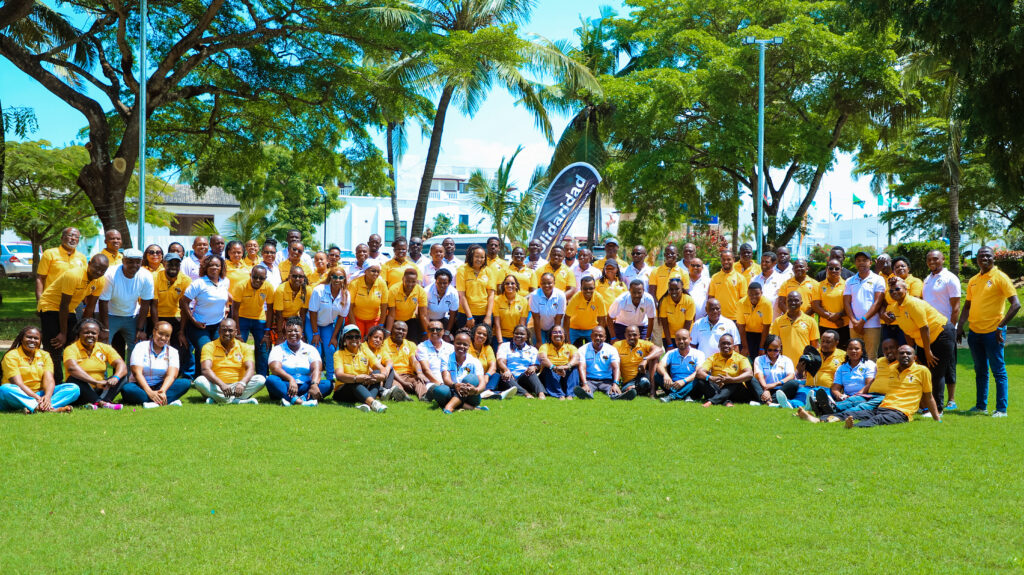
In East Africa, Solidaridad had a total workforce of 103 dedicated staff. The diverse composition of our team reflected our commitment to inclusivity. The gender distribution, with 47 percent female and 53 percent male staff, exemplifies our dedication to fostering a balanced and equitable work environment. The country breakdown was as follows: Kenya had 41 staff of whom 56 percent were female; Uganda had a team of 23 staff of whom 48 percent were female; Tanzania had 21 staff of whom 43 percent were female; while Ethiopia had 18 staff of whom 28 percent were female.
Diversity, Equity and Inclusion
Our commitment to fostering a diverse and inclusive workplace took centre stage in 2023, with the HR unit proactively addressing the need for gender balance. A strategic approach was employed that resulted in the internal promotion and external recruitment of female staff to key leadership, management and decision-making roles. This not only demonstrated our dedication to gender equality but also contributed to building a workforce that is well-balanced and equitable. The efforts made to promote female staff into leadership roles have significantly enhanced the overall diversity of our organisational structure.
Learning and Development
Our approach to learning and development saw a transformative shift in 2023, as initiatives evolved to become more personalized and adaptive. In response to the evolving needs of our staff, we placed a notable emphasis on developing leadership skills, with a specific focus on fostering a diverse leadership team. The introduction of the Leadership Masterclass: Coaching for High Performance was a milestone achievement. It provided our leaders (including country managers and heads of department) with essential skills to thrive in their roles. This initiative not only enhanced individual capacities, but also contributed to the creation of a leadership team that reflects the rich diversity within our organisation.
Ethical Practices and Transparency
Strengthening our commitment to ethical business practices and integrity within HR processes was a cornerstone of our endeavours in 2023. The HR team took significant steps to ensure transparency in various HR processes, including hiring, online performance evaluations and promotion processes. This commitment was not only communicated internally, but shared openly with all staff to ensure that clarity, fairness and accountability became the pillars of our organizational ethos. This focus on ethical practices has contributed to a workplace culture rooted in trust and responsibility.
Team Building
The year 2023 saw a vibrant three day team-building event that brought together about 100 staff from our four countries of operation for meaningful interaction and collaboration. This initiative was designed to enhance communication, foster team spirit, and create a positive work environment. The success of this event was a testament to our dedication to building strong internal relationships and promoting a cohesive organisational culture. By investing in team building, we are nurturing a work environment t
In East Africa, Solidaridad had a total workforce of 103 dedicated staff. The diverse composition of our team reflected our commitment to inclusivity. The gender distribution, with 47 percent female and 53 percent male staff, exemplifies our dedication to fostering a balanced and equitable work environment. The country breakdown was as follows: Kenya had 41 staff of whom 56 percent were female; Uganda had a team of 23 staff of whom 48 percent were female; Tanzania had 21 staff of whom 43 percent were female; while Ethiopia had 18 staff of whom 28 percent were female.
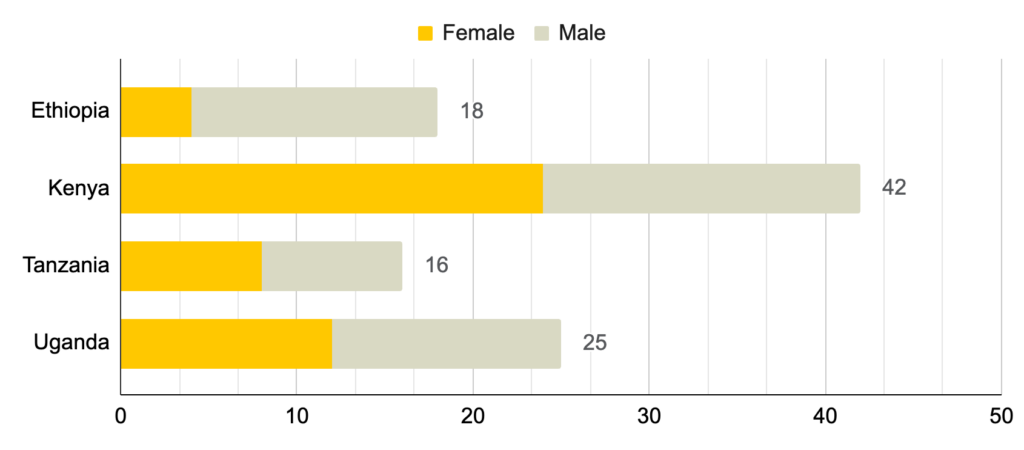
Diversity, Equity and Inclusion
Our commitment to fostering a diverse and inclusive workplace took centre stage in 2023, with the HR unit proactively addressing the need for gender balance. A strategic approach was employed that resulted in the internal promotion and external recruitment of female staff to key leadership, management and decision-making roles. This not only demonstrated our dedication to gender equality but also contributed to building a workforce that is well-balanced and equitable. The efforts made to promote female staff into leadership roles have significantly enhanced the overall diversity of our organisational structure.
Learning and Development
Our approach to learning and development saw a transformative shift in 2023, as initiatives evolved to become more personalized and adaptive. In response to the evolving needs of our staff, we placed a notable emphasis on developing leadership skills, with a specific focus on fostering a diverse leadership team. The introduction of the Leadership Masterclass: Coaching for High Performance was a milestone achievement. It provided our leaders (including country managers and heads of department) with essential skills to thrive in their roles. This initiative not only enhanced individual capacities, but also contributed to the creation of a leadership team that reflects the rich diversity within our organisation.
Ethical Practices and Transparency
Strengthening our commitment to ethical business practices and integrity within HR processes was a cornerstone of our endeavours in 2023. The HR team took significant steps to ensure transparency in various HR processes, including hiring, online performance evaluations and promotion processes. This commitment was not only communicated internally, but shared openly with all staff to ensure that clarity, fairness and accountability became the pillars of our organizational ethos. This focus on ethical practices has contributed to a workplace culture rooted in trust and responsibility.
Team Building
The year 2023 saw a vibrant three day team-building event that brought together about 100 staff from our four countries of operation for meaningful interaction and collaboration. This initiative was designed to enhance communication, foster team spirit, and create a positive work environment. The success of this event was a testament to our dedication to building strong internal relationships and promoting a cohesive organisational culture. By investing in team building, we are nurturing a work environment that encourages collaboration, innovation and mutual support.
Implementation of BambooHR:
One of the transformative moments of 2023 was the successful adoption of BambooHR. This robust human resources management information system (HRMIS) has significantly improved HR analytics and streamlined various HR processes. The seamless integration of BambooHR has brought efficiency to tasks such as data management, reporting, timesheet management, leave management and employee self-service. The implementation of this system has not only enhanced decision-making processes within the HR domain, but it has had a positive impact on the overall effectiveness of our HR operations. It stands as a testament to our commitment to staying at the forefront of technological advancements in HR management.
In 2023, Solidaridad prioritized strategic partnerships and deeper engagement to attract and strengthen collaboration with new and existing donors, partners and governments. As part of our continued business development efforts, we submitted 33 concepts and proposals for funding. We successfully secured the National Oil Palm Project (NOPP) funded by the Ministry of Agriculture, Animal Industry and Fisheries of Uganda and IFAD and the Creating Shared Value in the Maize Value Chain (CSV) project funded by the Louis Dreyfus Foundation (LDF). Our total project portfolio included 37 projects with a total budget of 9.9 million euros as of December 2023.
To advance our position as a value chain development think tank, we built partnerships and formalized engagement with organizations like E4Impact to enhance our agribusiness and entrepreneurship interventions, while leveraging funding from new donor agencies, including Italian-based donors. To strengthen our presence, expand our portfolio and tap into existing development funding opportunities in Central Africa, we initiated collaborations with the African Chamber of Commerce in Cameroon.
Through the Dutch Ministry of Foreign Affairs funded RECLAIM Sustainability! programme, we were able to commission four fair value distribution surveys for coffee, gold, tea and food products value chains in Kenya and Uganda. Findings provided insights into the specific bottlenecks farmers, workers and miners face in accessing and sustaining equitable markets for, and receiving benefits from, their produce and/or services offered. Preliminary findings provided a basis for sector-led dialogues including multi-stakeholder platforms on policies at community, national and regional levels.
Through our partnership with media civil society organizations — Water and Environment Media Network Uganda and Kenya Environment and Science Journalists Association — we also conducted multi-faceted community and media campaigns to provide platforms to amplify citizens’, producers’ and stakeholders’ voices. The campaigns were held through local barazas (meetings) featured in media — local radio and national television, newspapers. In addition to raising awareness on fair pricing, incomes and wages, the campaigns demanded decent and safe work, environmental protection — including mercury-free gold mining — gender and social inclusivity and enabling policies.
In 2023, the survey findings will be analyzed and key recommendations packaged into policy briefs for use in high-level lobbying and advocacy with policy makers, governments and other actors in the value chains. The policy briefs will also inform the agenda for multi-stakeholder platform dialogues.
Timely and effective communication remained crucial for the advancement of our overarching goal and mission. Throughout 2023, our communications unit played a pivotal role in strengthening our positioning and reputation at the country, regional and global levels. As a result, Solidaridad attained notable milestones by employing strategies for media engagement, awareness and advocacy campaigns, impactful digital communications, and effective storytelling. Our targeted communications initiatives facilitated ongoing engagement with our key stakeholders (both internal and external), donors, and the public, providing updates on our organisational and programmatic efforts, achievements and positions.
The communications unit continued to amplify the visibility of Solidaridad’s brand, voice and messaging through national, regional and grassroots media outlets throughout 2023. Through our growing partnerships with media, we achieved over 100 media outreaches that resulted in an estimated 10 million views through online, TV, radio and print media. The substantial growth in our media partnerships and media presence reflected our growing brand awareness and credibility. Importantly, this allowed us to directly and indirectly (through our project partners, CSOs and beneficiaries) promote and persuade value chain actors including farmers, workers and miners to embrace sustainable production practices. Our outreaches also facilitated us to lobby for effective policies and catalyse change geared towards overall sustainable development, inclusivity and profitability.
Throughout the year, we championed and supported thematic campaigns geared towards fostering sustainable supply chains. The campaigns, which were driven by and/or centred on producers’ (farmers, workers and miners) issues were held during key international days among them International Women’s Day, International Youth Day, International Tea Day, International Coffee Day, World Food Day and the 16 Days of Gender Activism against Sexual and Gender-Based Violence. Campaigns were implemented on digital platforms and at the grassroots to reach our diverse audiences with key messaging and relevant calls to action. Collaboration with key stakeholders in the country and/or grassroots campaigns enabled us to reach new audiences and achieve external endorsement from top government representatives in countries like Kenya.
To contribute to sector dialogues, we secured speaking slots and/or side events in international and regional events and forums among them the 2023 Africa Climate Week, COP28, OECD Forum on Responsible Mineral Supply Chains, FAO World Food Forum, RSB Annual conference, 5th International Congress on Planted Forests, Safe and Decent Work Conference and the African Fine Coffees Association (AFCA) conference among others. Through these forums, we showcased our innovative value chain development solutions, and milestones and presented our positions/calls to action to different actors in our supply chains.
Additionally, we invested in digital communications to amplify our impact with our target audiences and the general public. Among these initiatives, we implemented strategic online campaigns, dynamic social media engagement and innovative content creation. As a result, our digital footprint expanded, fostering brand awareness and support for our initiatives.
Awards and recognitions:
- Solidaridad Tanzania was awarded the Shield Trophy as one of the substantial contributors to the tea sub-sector development in Tanzania in the area of Voluntary Sustainability Standards training, farmers certification, and market linkages for tea farmers.
- Solidaridad East and Central Africa also clinched the Tech for Good Impact Award, presented by Zendesk, in recognition of our commitment to advancing social causes. This award will propel sustainable production, bolster climate resilience, and foster gender and social inclusivity among 1,000 smallholder coffee farmers in Kenya, leveraging digital advisory services.
- In 2023, Kenya received excellent recognition from TerraFund for the Shade For Vegetables (SAVE) Project. The #SAVEProject will empower 2,000 smallholder farmers in Nyandarua County, Kenya. It is a six-year project that aims to integrate 160,000 trees of diverse species into vegetable farming systems bordering catchments and watershed areas. The project aims to restore 250 hectares of degraded catchments of Oljororok and Ndaragwa in Nyandarua County by 2029.
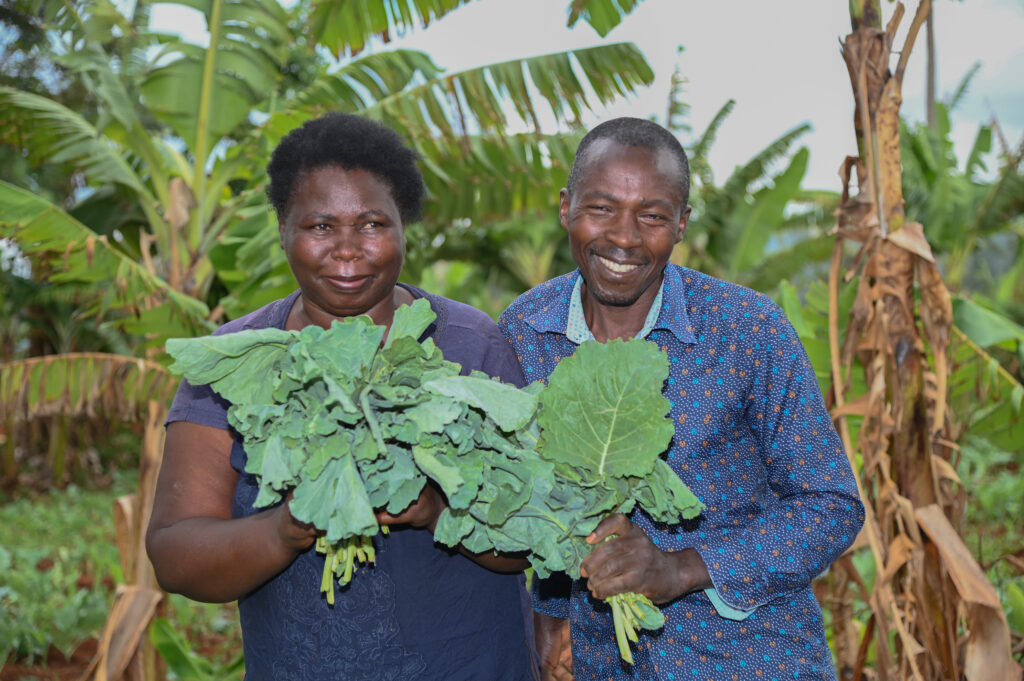
During the year, Solidaridad conducted a mid-term review for the Dutch Ministry of Foreign Affairs funded RECLAIM Sustainability! programme in Ethiopia, Kenya, and Uganda. The evaluation involved five learning and reflection sessions with key stakeholders from the coffee, tea, food products, gold, cotton and textiles sector. The qualitative methodology provided stakeholders with a unique opportunity to participate in project evaluation and provide feedback to shape the design and implementation of the current and future project. The mid-term evaluation approach was lauded as an inclusive methodology and adopted for existing and future project evaluations. One of the key conclusions indicated that through capacity building, the build-up of evidence, and the amplifying of voices through multi-stakeholder platforms (MSPs), the programme had established a good foundation from which to highlight the plight of farmers, workers and miners to other value chain actors.
In Ethiopia, we conducted the end-of-project evaluation for the European Union funded Bottom Up! project, whose goal was to create a sustainable cotton and textile value chain in Ethiopia. Among the key findings were that ginneries that complied with Cotton Made in Africa (CmiA) and Better Cotton Initiative (BCI) standards and sector associations promoted sustainable environmental technologies. It appears that despite the difficulties Bottom Up faced during its implementation period, due to events related to the COVID-19 pandemic and the war in Tigray, the project was relevant to the context of the needs and aspirations of the textile industry in Ethiopia.
In 2023 we carried out a mid-term evaluation of a European Union financed coffee project in Tanzania and noted a 13 percent increase of cherry output per tree per season from the baseline. The contributing factors to the increased average yield per tree included adherence to good agronomic practices (GAP), specifically pruning, fertilisation and the proper use of pesticides.
During the baseline studies for the Dutch funded Pathway to Prosperity project in Kenya and Tanzania, it was noted that the majority of the farmers had been indirectly reached by either the Practice for Change or other European Union funded programmes, and therefore had started to adopt various models to address climate change and the loss of soil fertility. Overall, manure application (86 percent), shade trees (75 percent) and agri-waste coffee management (60 percent) were the most adopted climate-smart adaptation measures. Similarly, the baseline research results for Acting Now for Food Security and Resilient Food Systems project in Ethiopia and Kenya indicated that 47 percent of farmers reported that farm income had declined compared to the previous year. On the other hand, 40 percent noted an unchanged income, while 13 percent pointed to an increase in farm income. Declining incomes were associated with climate change and a lack of diversification initiatives at the farm level.
Solidaridad East and Central Africa has fully adopted KoboToolbox for all data collection needs. The software has enabled seamless data collection, analysis and storage. We also rely on the data points indicated in the data model while carrying out farmer profiling, baselines, mid-term reviews (MTRs), and final evaluations.
Following the implementation of our Whistleblower Protocol in 2021, a regional Integrity and Inclusivity team led by an Integrity Advisor was constituted to provide leadership and oversight the implementation of integrity-related efforts — risk prevention, detection and response. In addition, Solidaridad nominated Persons of Trust in Ethiopia, Kenya, Tanzania and Uganda to facilitate communication and incident reporting at the country level to enhance adherence to our Code of Conduct. To foster open discussions on and mitigate potential breaches, we also provided training on the Whistleblower Protocol and Code of Conduct.
A total of 84 staff were also sensitized on the incidence reporting protocol and flowchart. Two cases of conflict of interest were reported and appropriate corrective measures taken. In the same period, Solidaridad East and Central Africa and Solidaridad Southern Africa teams collaborated to develop joint inclusivity action plans. Joint implementation is scheduled to commence in 2023.
Finance
Solidaridad East & Central Africa’s income stood at EUR 9.6 million in 2024, a decrease from 2023 due to the conclusion of three European Union (EU) -funded projects in Tanzania and Ethiopia. The principal sources of income in 2024 were grants from the EU, the World Bank, and Danida. To ensure continued impact, we actively expanded our network of strategic partnerships, building upon the strong foundations laid by our vital donor relationships to drive sustainable growth in the years to come.
EUR 9.6 million was spent on project implementation and acquiring a regional head office. This represented decreased spending due to the conclusion of three EU projects, two in Tanzania and one in Ethiopia.
We deeply appreciate the continued support of our key partners, the EU, the World Bank, and Danida, whose grants formed the foundation of our 2024 activities.
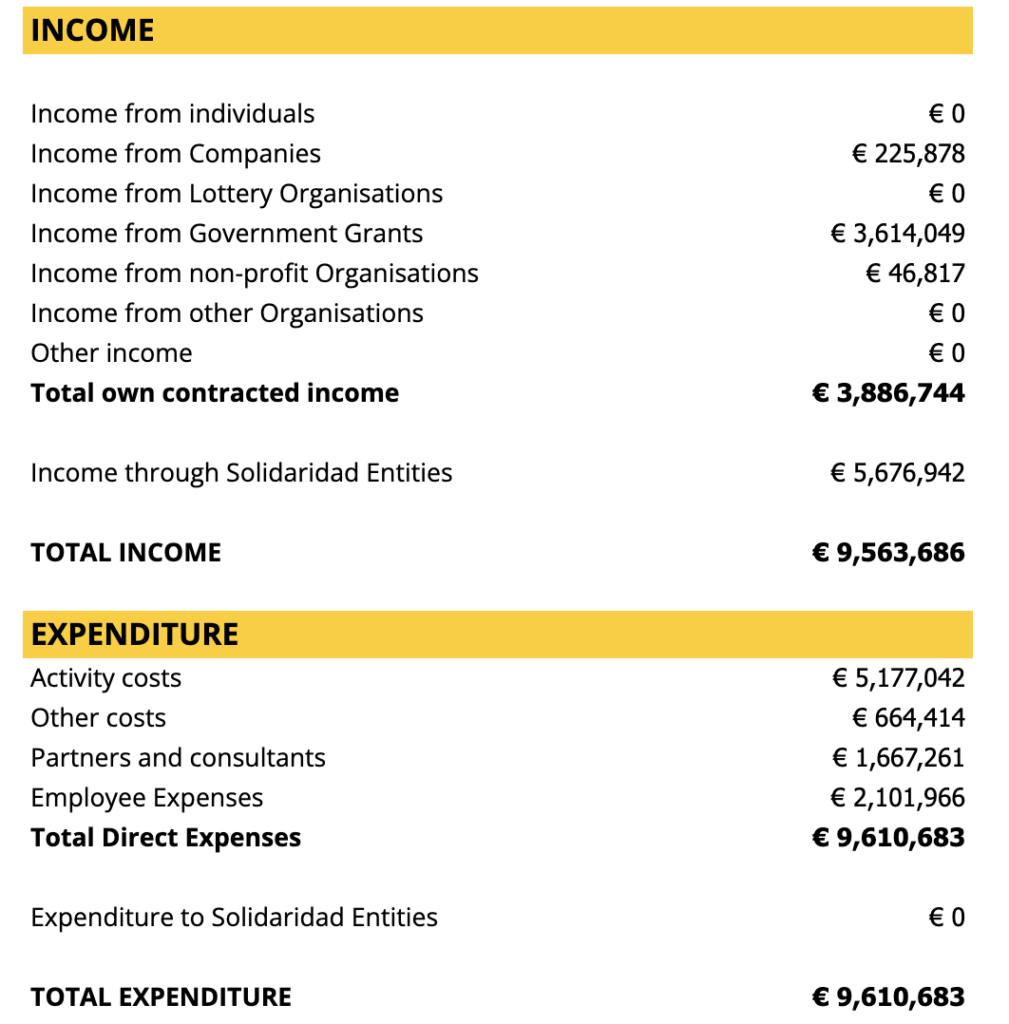
All information above is based on the unaudited figures over 2024. The official audited financial statements over 2024 will be uploaded here as soon as they are available.

